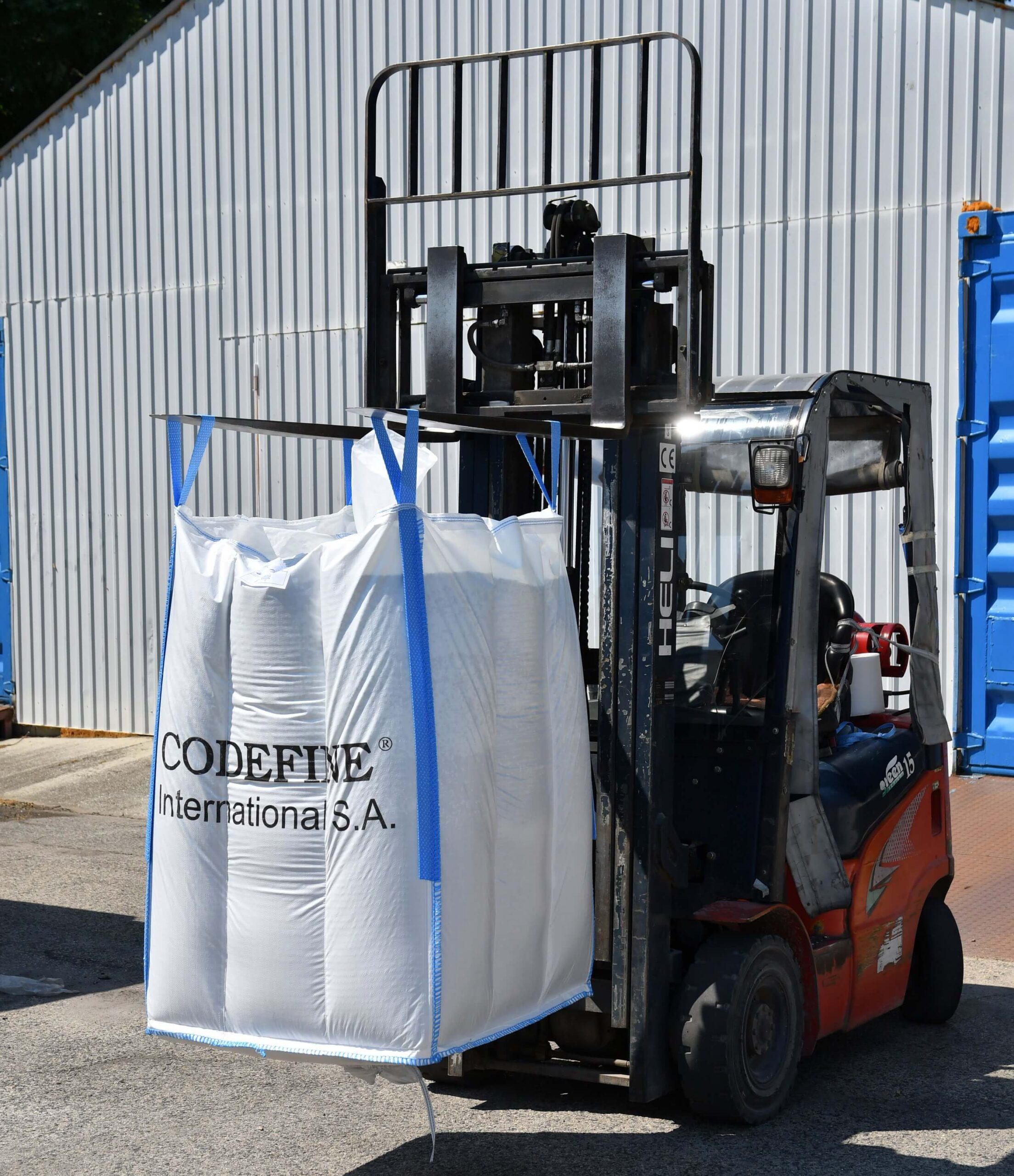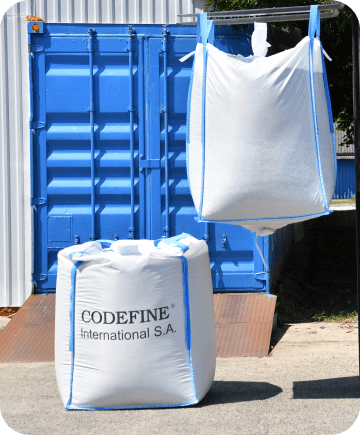Home » Posts Page » Blog » The Importance of UN Certified Bulk Bags (2025 Guide)

While ordinary FIBCs can be used to store and transport a huge range of materials, they’re not a good solution for housing hazardous materials. What’s more, if dangerous goods need to be transported across long distances, a more robust and secure packaging solution is needed.
In these scenarios, only UN approved bulk bags will do. A staple of the shipping industry and industrial sector, these heavy-duty bulk bags need to adhere to strict packaging industry standards and pass rigorous tests set out by the United Nations. Looking to learn more about UN certified bulk bags? We’ve got you covered.
UN approved/certified bulk bags are essential for when typical FIBCs don’t meet international standards and regulations. These scenarios generally involve hazardous materials that need to be stored and transported. If you’re looking for packaging for hazardous goods like chemicals, flammable powders, or toxic materials, UN-certified bulk bags are the only option.
To ensure compliance with UN regulations, FIBC certification organizations carry out extensive tests to guarantee the quality and performance of bulk bags. As well as being fit for purpose, FIBCs also need to be correctly marked and labeled.
As well as guaranteeing bulk bag quality, UN certification aims to minimize the risk of harm to individuals handling said bags, as well as the general environment. Unlike regular FIBCs, UN-approved bags are manufactured to a high standard and need to pass strict testing criteria. Only when FIBCs meet these strict conditions will a bulk bag be declared as UN-certified.
It’s worth pointing out that UN certification alone isn’t the only thing to consider. Regulations change depending on the materials you’re transporting or storing in a bag. What’s more, different types of UN bulk bags are available. You’ll find bags boasting different load-bearing capacities, as well as a choice of coated and uncoated FIBCs. Furthermore, you can bolster the safety credentials of a certified bulk bag by using a UN approved liner.
As with regular FIBCs, UN bulk bags are incredibly versatile and can be used across many industries. However, thanks to their superior construction and the extensive testing that they’re put through, UN bags are ideal for the storage and transportation of hazardous materials, from chemicals to industrial waste. This makes them ideal for use in the pharmaceutical industry.
You also need to be wary about safety and compliance. Some countries don’t have robust guidelines in place regarding packaging safety, but UN certification benefits everyone. By investing in high-quality bags that have been granted UN certification, you can be confident that workers and the public are protected, while the threat to the environment is minimal.
UN-approved bulk bags are also recommended for international haulage. If you’re moving hazardous goods from one country to another, using UN-certified FIBCs ensures you’re constantly complying with international standards. While UN bulk bags are generally the best solution for transporting volatile materials over long distances, they’re also an effective storage solution. If harmful substances need to be stored for long periods of time in a work premises, these certified bags can dramatically reduce the chance of leaks and contamination.
To provide users with peace of mind, UN packaging needs to undergo a series of rigorous tests. Unsurprisingly, testing parameters are quite broad and bags need to pass in every category before they can be declared safe for use.
Certification organizations will usually start with a so-called top lift test. Here, the load-bearing capacity of the FIBC bag is put through its paces. Bags are first filled to their maximum capacity before hydraulic force is used to exert additional pressure. In other words, the bag is overfilled with many times its quoted load. If the bag can maintain its shape and avoid breaking for five minutes, it will pass the top lift test.
Then there’s the stacking test. Once again, a bulk bag is filled to its quoted capacity and laid flat on even ground. Next, the pressure of two additional bags is placed on top of the original one. This testing stage is particularly relevant if you’re looking for bulk bags for storage or need to consider long-distance haulage journeys. If a bulk bag holds its shape and no material leaks out during 24 hours, it receives the green light. A topple test is also used to simulate bags that are stored at height. Once filled and placed upon a platform, the platform is toppled. If the bag survives, it passes this stage of UN certification.
The drop test is another important stage of UN certification, and vital for things like hazardous materials confinement. As with previous tests, a bulk bag is filled with material up to its safe working load before it is dropped from incrementally higher heights. If a bag survives the drop without tearing or leaking its contents, it passes the drop test.
With the righting test, bulk bags are filled to their safe working capacity and forced onto their side. The toppled bag is then returned to its original position, although only two lifting loops are used. The bag itself, along with its lift loops, should be free of any damage once the righting test is complete.
The tear test involves a full FIBC being cut at a specific angle. The tear shouldn’t expand in size beyond a quarter of the size of the original incision, even when additional pressure is applied.

The FIBC certification process delivers the gold standard in quality assurance. As well as determining the strength and structure of bulk bags, FIBC testing guarantees that the bags themselves are suitable for the sector they’re intended for. Different tests may be carried out if bulk bags are bound for a specific industry sector. This can include testing for resistance to water absorption if bags are to be used to store perishable items or chemicals for the pharmaceutical industry.
The individual specifications of FIBC bags can also influence testing and the certification process. If custom bags have been made to order, they may feature a different arrangement of lifting loops or discharge spouts. These can influence the UN packaging tests outlined above.
Although UN bulk bag certification brings reassurance, it’s also worth asking your supplier about the exact quality checks your FIBCs have gone through. Suppliers who offer batch testing as standard are the most reliable, as potentially faulty bags can be quickly pulled. Once your bags have arrived, make sure you’re inspecting any batch numbers or labels. If details like manufacturing date aren’t clearly visible, consider this a red flag.
There are many differences between certified and non-certified bags. As a rule, UN approved bulk bags have been manufactured to a higher quality. This makes them incredibly durable. This becomes obvious when you look at the safety rating of UN approved and non-certified bulk bags. A normal FIBC bag has a 5:1 safety ratio. With a UN bulk bag, the safety ratio rises to 6:1.
You also need to consider specific safety requirements. Looking for hazardous materials packaging solutions? A regular bulk bag will fall far short of the safety and compliance regulations. However, there’s no such issue with UN certified bulk bags.
Once again, it’s worth mentioning the extensive testing that’s involved in the certification of UN bulk. The majority of certification providers carry out a gamut of tests, with many performing additional checks to provide an added guarantee of safety. Depending on your industry sector, it could be worth seeking out a FIBC supplier who goes the extra mile when testing bulk bags.
Looking to transport or store harmful materials? If you’re dealing with anything that poses a risk to human health or can cause damage to the environment, an everyday FIBC simply won’t do. With UN approved bags, you can be confident that you’re adhering to the highest safety standards, without the worry of international red tape holding back the logistics of your operation.
When it comes to FIBC bags, UN certification is far from a label. As well as being a guarantee of premium quality and durability, it lets businesses ensure they’re always in line with the latest safety guidance and regulations. If you’re thinking about UN bulk bags, hazardous materials are probably a fact of life. Without UN approved bags, you won’t be able to handle and transport these goods safely.
No matter what industry you operate in, it’s never a good idea to cut corners when choosing bulk bags. Always use a trusted supplier with an established track record. What’s more, don’t be afraid to press your supplier for further information about testing procedures.